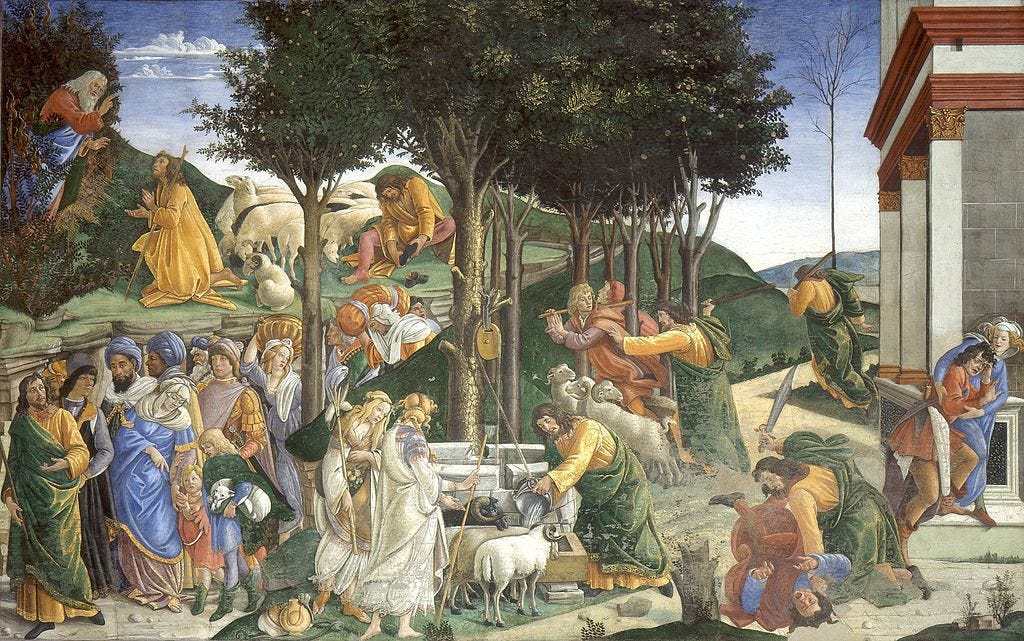
Parsha Summary: The penultimate chapter in the Torah begins and ends with a glorious tune Moshe composes for the forthcoming Eurovision Biblical Song Contest. Look but no touch is G-d’s message to Moshe staring from the summit of Mount Nebo at the glorious land of Milk and Honey. “For you shall see the land opposite you; but you shall not go there, into the land which I give to the children of Israel.” As he hits his keynote, Moshe drops dead, broken-hearted at the age of 120.
It’s a story as old as time. A young whippersnapper rejected by society seeks solace with his flock of sheep before being catapulted into stardom by the hand of G-d. Except there was no fairytale ending for the local lad from the backstreets of Egypt. Moses would die alone, stranded on a mountaintop, singing a song nobody requested.
The penultimate parsha has a single chapter dedicated to Moses and his awful warbling. He of the heavy mouth and even heavier tongue, gurgled and gargled his way through his own melodic composition. Without Miriam adding structure to his ceremonial dirge, the crooning lacked harmony. It was an odd, baroque piece of tunefoolery. Stubbornly crescendo where none was required and drifting in a morose swamp of self-pity longing for a grandiose finish.
Centuries would pass before the original version became erased from memory, Baruch Hashem!
But the words…oy, the words! Here Moses revealed his true calling.
At the tender age of seven, Moses won his first poetry competition with a sonnet entitled ‘My Mother is Not My Mother’. A revealing look into the dynamics of the Pharoah’s household. The critics loved it, at least those who favored poetry written by children of the ruling clan.
Encouraged by his debut, Moses launched a 50-page papyrus scroll with a foreword written by none other than the Egyptian God of Love, Hathor. A masterpiece that earned him the prestigious title of Egyptian Young Poet of the Year. Nobody scorned or felt a sense of injustice for the son of a Pharoah winning. Nope. Nothing to see here. Nepotism was a word yet to be invented.
One year shy of his bar mitzvah, if Moses was ever to discover his Jewish roots, and reckless with youth, he entered a Poetry Slam in the Kingdom of Cush, south of Egypt. His many advisors warned Moses that the people of Cush may not be ready for his style of poetry. The Cushites (literally shit people) were Philistines long before the Philistines acquired their sobriquet of ‘haters of art’.
Pity poor, brave Moses.
If being abandoned by your birth mother in a basket of reeds was traumatic, deafening silence in a slam poetry contest comes awfully close. Once the onlooking crowd got over the shock of listening to pre-pubescent angst spoken with all the force and conviction of a lost child, they doubled down in hysterical laughter.
Moses fled the stage, humiliated and in tears. He ran to the bosom of his adopted mother stuttering with shock. He had never faced an ordeal quite like this.
On his journey home, attempting to numb the pain the only way a child could, Moses binged on pineapple laced with Crocodile Chilly sauce and gallons of bootleg Nile Water. As he cried bitter tears infused with hot sauce, he vowed never again to write poetry or enter any more slam contests.
Soon after, Moses’ initial stammer bloomed to full-blown incontinence. The Egyptian world rejoiced in never having to listen to Moses talk in public again.
And now? During his last days on Earth, aged 120, Moses took it upon himself to write a soliloquy to G-d. One final act of love and devotion garnered in 120 years of craftsmanship. A hidden talent was finally revealed. The stammer long gone, Moses delivered his valediction to an adoring crowd.
“Listen, O heavens, and I will speak! And let the earth hear the words of my mouth!” (32:1)
Sometimes it takes an age for talent to truly shine.





And so ends a legendary Biblical career....